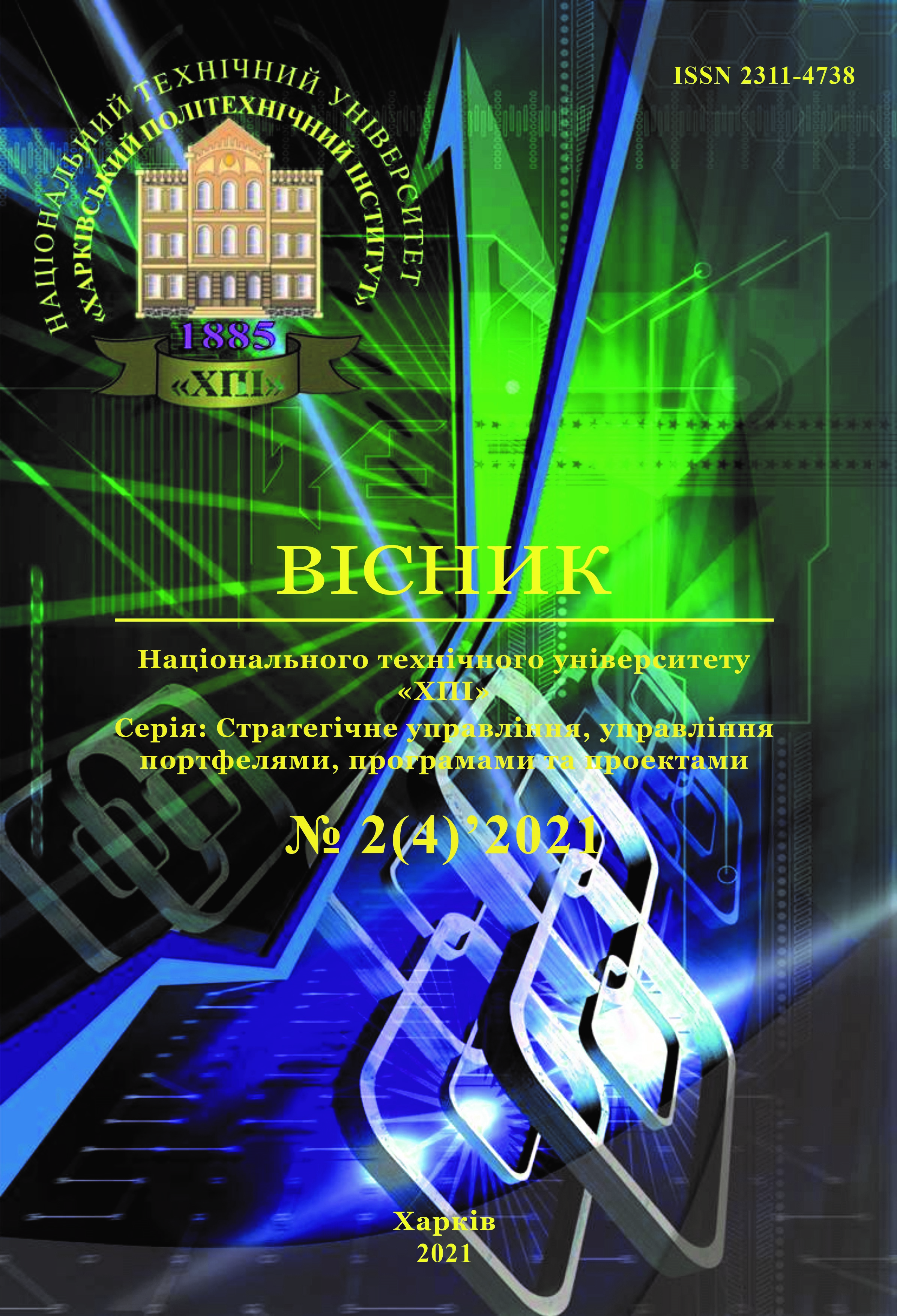PORTFOLIOS FORMATION OF MOTOR TRANSPORT ENTERPRISES HYBRID PROJECTS
DOI:
https://doi.org/10.20998/2413-3000.2021.4.9Keywords:
portfolio formation, hybrid projects, motor transport enterprises, value, managementAbstract
The state use analysis of the project-oriented management in the enterprises of various subject branches is executed. The expediency of hybrid projects portfolios forming of motor transport enterprises and method developing for performing the specified management process is substantiated. The proposed method of hybrid projects portfolios forming of motor transport enterprises involves the implementation of four stages and twelve systemically related management processes, which take into account the characteristics of the subject area and project activities in it, as well as the design environment. In contrast to the existing methods of project portfolio formation, the proposed method proposes the experience usage of previously implemented hybrid projects. The peculiarities of the project environment of individual hybrid projects of motor transport enterprises and temporarily available resources (vehicles, contractors) are taken into account. Simulation of hybrid projects is envisaged to assess their value, which provides high-quality forecasting of the level of satisfaction of stakeholders of individual hybrid projects carried out under different scenarios. The balance of the hybrid projects portfolio is offered by using cluster model of their value, which provides the identification of priority hybrid projects that have the maximum value for stakeholders.
References
Бушуев С. Д., Бушуева Н. С. Механизмы формирования ценности в деятельности проєктно-управляемых организаций. Восточно Европейский журнал передовых технологий. 2010. №1/2 (43). С. 4 – 9.
Тригуба А. М., Боярчук В. М., Тригуба І. Л., Боярчук О. В., Рудинець М. В. Особливості планування проєктів створення кооперативів кормозабезпечення сімейних молочних ферм. Вісник Національного технічного університету "ХПІ". Серія : Стратегічне управління, управління портфелями, програмами та проєктами. 2019. № 2. С. 73-78.
Ratushny R.Т., Shcherbachenko O.M. Scientific and Methodological Grounds for Investigating the Connections in Fire Extinguishing Systems of the United Territorial Communities. Przedsiębiorczość i Zarządzanie. No. 2.3, 2018. Р. 153-166.
Тригуба А. М. Класифікація та особливості реалізації інтегрованих проєктів аграрного виробництва. Управління проєктами, системний аналіз і логістика. Технічна серія. 2011. Вип. 8. С. 197-201.
Кононенко И. В., Букреева К. С. Модель и метод оптимизации портфелей проєктов предприятия для планового периода. Восточно-Европейский журнал передовых технологий. 2010. 1/2(43). С. 9- 11.
Гогунский В. Д., Руденко С. В., Тесленко П. А. Обоснование закона о конкурентных свойствах проєктов. Управління розвитком складних систем. Київ : КНУБА, 2012. Вип. 8. С. 14-16.
Ванюшкин А. С. Портфельные концепции и ограничения их применимости. Управління проєктами та розвиток виробництва. 2014. № 2. С. 144-151. URL: http://nbuv.gov.ua/UJRN/Uprv_2014_2_16. (дата звернення: 15.11.2020).
Арчибальд Рассел Д. Управление высокотехнологичными программами и проєктами. ДМК Пресс, 2004. 472 с.
Кендалл Д. И., Роллинз С. К. Современные методы управления портфелями проєктов и офис управления проєктами: Максимизация ROI. М: ПМСОФТ, 2004. 576 с.
Матвеев А. А., Новиков Д. А., Цветков А. В. Модели и методы управления портфелями проєктов. М.: ПМСОФТ, 2005. 206с.
Данченко О. Б., Лепський В. В. Сучасні моделі та методи управління проєктами, портфелями проєктів та програмами. Управління розвитком складних систем: збірник наукових праць. Київ : КНУБА, 2017. № 29. С.46-54.
Фесенко Т. Г. Формування змісту портфеля інвестиційно-будівельних проєктів. Вісник Національного технічного університету "ХПІ". Серія : Стратегічне управління, управління портфелями, програмами та проєктами. 2014. №2. С. 45-52. URL: http://nbuv.gov.ua/UJRN/vntux_ctr_2014_2_10
Тригуба А. М., Шелега О. В., Пукас В. Л., Михайлюк В. М. Узгодження конфігурацій інтегрованих проєктів аграрного виробництва. Вісник Національного технічного університету "ХПІ". Серія : Стратегічне управління, управління портфелями, програмами та проєктами. 2015. № 2. С. 135-140.
Тригуба А. М., Шолудько П. В., Сидорчук Л. Л., Боярчук О. В. Системно-ціннісні засади управління інтегрованими програмами розвитку молочарства на основі моделювання. Вісник Національного технічного університету "ХПІ". Серія : Стратегічне управління, управління портфелями, програмами та проєктами. 2016. № 2. С. 103-107.
Kobylkin, D., Zachko, O., Popovych, V., Burak, N., Golovatyi, R., Wolff, C. Models for Changes Management in Infrastructure Projects. ITPM 2020. URL: https://www.semanticscholar.org/paper/Models-for-Changes-Management-inInfrastructure-Kobylkin-Zachko/9e91a135c4533e7cc58fd18ded3e81a49d9295d9#related-papers. (дата звернення: 22.10.2020).
Robert G. C., Scott J. E., Elko J. K. New problems, new solutions: making portfolio management more effective. Research-Technology Management, 2000. Vol.43, No. 2. 29р.
Pіterska, V. M., Shakhov A. V. Development of the Methodological Proposals for the Use of Innovative Risk-Based Mechanism in Transport System. International Journal of Engineering & Technology. 2018 . Vol. 7 (4.3). Р. 257-261.
The standard for Portfolio Management. Global standard. PMI. [Електронний ресурс]. Режим доступу: http://www.pmi.org/
Moran A. Configuration Management. Managing Agile. Springer Science + Business Media, 2015. P. 173–184.
National Consensus Standard for Configuration Management [Text] (ANSI/EIA649/–1998). Government Electronics & Information Technology Assoc., 20041998. 210 p.
The standard for portfolio management. Newtown Square: Project Management Institute, 2017. 127 p.
The Standard for portfolio management. Third Edition, Project management institute, 2013. 189 p.
Downloads
Published
Issue
Section
License

This work is licensed under a Creative Commons Attribution-NonCommercial-ShareAlike 4.0 International License.
Our journal abides by the Creative Commons copyright rights and permissions for open access journals.
Authors who publish with this journal agree to the following terms:
Authors hold the copyright without restrictions and grant the journal right of first publication with the work simultaneously licensed under a Creative Commons Attribution-NonCommercial-ShareAlike 4.0 International License (CC BY-NC-SA 4.0) that allows others to share the work with an acknowledgement of the work's authorship and initial publication in this journal.
Authors are able to enter into separate, additional contractual arrangements for the non-commercial and non-exclusive distribution of the journal's published version of the work (e.g., post it to an institutional repository or publish it in a book), with an acknowledgement of its initial publication in this journal.
Authors are permitted and encouraged to post their published work online (e.g., in institutional repositories or on their website) as it can lead to productive exchanges, as well as earlier and greater citation of published work.

